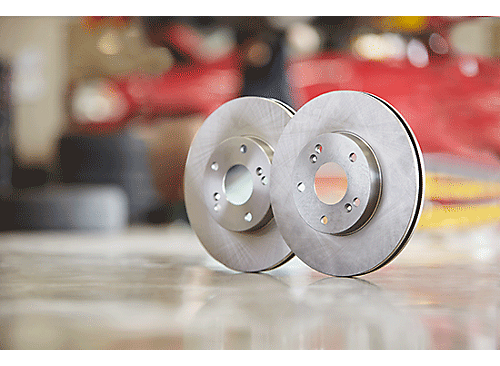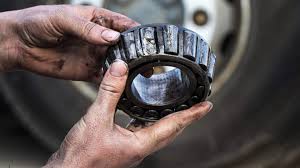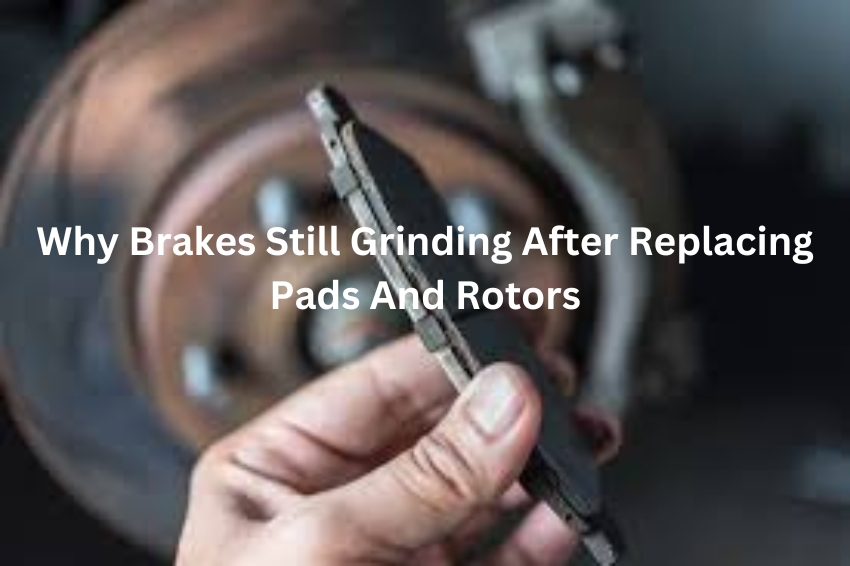Are you wondering why your brakes are grinding even after replacing the pads and rotors?
Our comprehensive breakdown analyzes the top five reasons behind this issue, drawing on insights from automotive specialists to provide clear explanations and potential solutions.
Why My Brakes Still Grind After Replacing Pads And Rotors?
Here are 5 reasons why your brakes still grind after you have replaced pads, and rotors:
1. Debris Contamination
One of the main reasons why your brakes grind noise after replacing your brake pads and rotors is debris contamination.
During the brake pad replacement process, tiny bits of metal shavings or rust can get lodged between the shiny new pads and rotors.
These minuscule particles act like sandpaper, causing a grinding or scraping noise, especially when you first start braking after the replacement.
https://revivenride.com/what-color-should-my-brake-fluid-be-normal-vs-contaminated/Here’s why debris contamination might happen even with a fresh brake job:
- Shop debris: Even in a clean workspace, there’s always a chance of stray metal shavings or dust lingering in the air. These can settle on the rotors during installation.
- Wear and tear residue: Even with careful cleaning, some microscopic wear particles from the old pads or rotors might remain on the braking surface.
While the noise from debris contamination can be alarming, it’s usually not a major cause for concern.
In most cases, the grinding should subside after a short bed-in period (typically the first 100-200 miles of driving) as the pads wear down and smooth out any trapped debris.
However, the grinding noise caused by debris contamination is usually most noticeable during low-speed braking applications.
If you suspect debris contamination, there are a few things you can try:
- Take your car for a short, cautious drive to see if the noise lessens during the bed-in period.
- Consult a mechanic for a professional inspection and cleaning of the rotors and pads. They can ensure all debris is removed and identify any underlying issues.
2. Improper Rotor Resurfacing

During a brake job, mechanics sometimes recommend resurfacing, also known as machining, the rotors.
This process smooths out the braking surface to ensure even contact with the new pads.
However, improper rotor resurfacing can lead to grinding noises after the replacement.
Here’s why resurfacing isn’t always necessary and how it can contribute to grinding:
- Not all rotors need resurfacing: Rotors have a minimum thickness specified by the manufacturer. If your rotors are within this safe range, resurfacing might not be required.
- Improper machining can cause warping: If the rotors aren’t resurfaced precisely, they can develop a warped surface. This unevenness creates a grinding sensation when the pads come into contact.
Should you resurface your rotors during a brake pad replacement?
It depends.
If your rotors were within the minimum thickness specification and showed no signs of warping before the job, resurfacing might not have been necessary.
In these cases, new pads bedded onto smooth rotors should operate quietly.
That being said, If you suspect improper rotor resurfacing, consulting a mechanic is important.
They can measure the remaining rotor thickness and assess if resurfacing was done correctly.
In some cases, the rotors might need to be replaced altogether to ensure safe and noise-free braking.
3. Caliper Issues

Your brake calipers are the essential clamps that squeeze the brake pads against the rotors when you press the brake pedal.
They play a crucial role in bringing your car to a safe stop.
While we’ve covered common issues with the pads and rotors themselves, sometimes grinding brakes can point to a problem with the calipers.
Here’s how:
- Sticking Caliper Piston: The caliper piston is responsible for pushing the brake pads against the rotors. If this piston gets stuck due to rust or wear, the pads might not fully retract from the rotors even when you release the brake pedal. This continuous contact can cause grinding noise.
- Worn Caliper Components: Over time, the various parts within the caliper, like slider pins or bushings, can wear out. This wear can cause the caliper to move unevenly, leading to uneven pad wear and grinding as the pads make inconsistent contact with the rotors.
- Uneven Pad Wear: Uneven wear on your brake pads can also be a sign of underlying caliper issues. If one pad is significantly more worn than the other, it suggests the caliper might not be applying pressure evenly. This uneven wear can result in grinding as the thinner pad makes more aggressive contact with the rotor.
Warning Signs and What to Do:
Here are some signs to watch out for:
- Grinding that is persistent and doesn’t improve with driving.
- The car pulls to one side when braking.
- A soft or spongy feeling when you press the brake pedal.
If you experience any of these signs, don’t hesitate to consult a qualified mechanic.
They can diagnose the specific caliper issue and recommend repairs or replacements to ensure your brakes function safely and quietly again.
4. Low-Quality Brake Pads

Not all brake pads are created equal, and the materials they’re made from can significantly impact noise generation.
While you might be tempted to go for the most budget-friendly option when replacing your pads, it’s worth considering how quality can affect your braking experience.
Here’s why low-quality brake pads might be contributing to your grinding noise:
- Simpler Materials: Higher-quality pads often incorporate specific compounds and additives designed to reduce noise during braking. Lower-cost pads might lack these features, leading to a more grinding sound when they contact the rotors.
- Lower Noise Reduction Standards: Premium and OEM (Original Equipment Manufacturer) brake pads are typically engineered with noise reduction in mind. Budget pads might not prioritize these standards, resulting in a noisier braking experience.
So, does this mean you automatically need to buy the most expensive brake pads? Not necessarily.
The ideal pad choice depends on your driving style and budget.
If you prioritize a quiet ride and are willing to invest a bit more, opting for reputable brands known for noise reduction technology might be a good choice.
Also, consult a qualified mechanic to assess your driving habits and recommend brake pads that strike a balance between quality, noise reduction, and affordability.
5. Wheel Bearing Problems

We’ve covered several reasons why your brakes might be grinding even after replacing the pads and rotors.
But there’s one more possibility to consider: wheel bearing problems.
Wheel bearings are essential components that allow your wheels to spin smoothly.
They sit at the core of the wheel hub and help distribute the weight of your car while reducing friction.
Although less common than brake issues, worn-out wheel bearings can sometimes mimic the sound of grinding brakes.
So, how can you tell the difference? It can be tricky for a non-mechanic to diagnose definitively.
Here are some signs that might point toward wheel bearing problems:
- The grinding noise persists: Unlike brake grinding that might lessen with driving (due to bed-in), wheel bearing noise often remains constant or worsens with speed.
- Noise changes with turning: Grinding that gets louder when you turn the wheel in one direction can be a sign of a failing wheel bearing on that side.
- Vehicle instability: In severe cases, worn wheel bearings can cause a shaky or loose feeling in the steering wheel while driving.
Worn wheel bearings can compromise your car’s stability and handling, especially at higher speeds.
If you suspect a wheel bearing issue, it’s important to consult a mechanic for a proper diagnosis.
